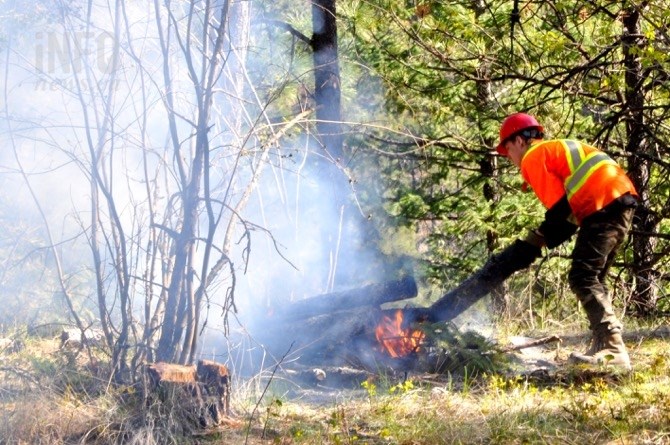
A forestry worker tends to a fuel management fire in West Kelowna.
(JOHN MCDONALD / iNFOnews.ca)
June 25, 2015 - 4:30 PM
KELOWNA - The B.C. Forest Practices Board is praising Kelowna’s wildfire fuel mitigation efforts as amongst the most advanced in the province even as it criticizes the overall lack of progress in B.C. in protecting urban interface areas.
“Today, Kelowna is an example of what communities can do to protect themselves. B.C. has been lucky it hasn’t had an catastrophic interface fires since Kelowna in 2003, but that has been luck and nothing more,” board chair Tim Ryan says in the preface to the report.
Andrew Hunsberger, urban forest health technician with the city, brought forward the board report Fuel Management in the Wildland Urban Interface in his own update to Kelowna city council about local fuel mitigation efforts.
“Kelowna is recognized as being a success story," he says.
Subject of criticism in the report are communities which have done little to reduce fuel loads in and around their interface in the last decade leaving the majority of high risk forests around urban areas untreated.
It also takes aim at individual property owners which it says have responded poorly to education programs such as FireSmart about fuel mitigation around homes and on private land.
If Kelowna is ahead of many other B.C. communities, it’s because of the 2003 Okanagan Mountain Park fire which destroyed 239 houses and forced the evacuation of over 30,000 residents. It remains the most destructive interface fire the province has experienced and spurred fuel mitigation efforts in the Central Okanagan and across B.C.
However, the report notes the initial enthusiasm for wildfire mitigation efforts has slowly diminished since then and only about 10 per cent of high risk forests around interface communities have recieved fuel management treatment.
The forest practices board says a number of obstacles stand in the way of more widespread fuel management including the prohibitive cost of about $10,000 per acre and limited participation by the forest industry in B.C.
To contact the reporter for this story, email John McDonald at jmcdonald@infonews.ca or call 250-808-0143. To contact the editor, email mjones@infonews.ca or call 250-718-2724.
News from © iNFOnews, 2015